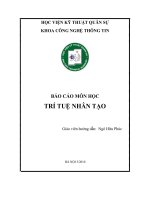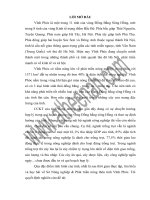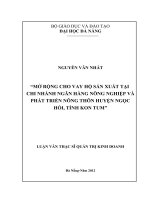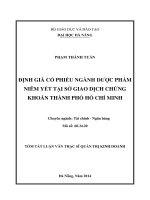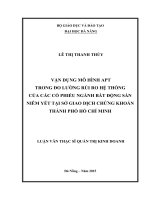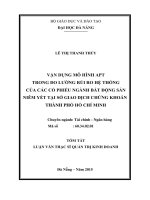trêng thpt b¸n c«ng nga s¬n ®ò kióm tra 1 tiõt sè ii líp 12 trêng thpt b¸n c«ng nga s¬n ®ò kióm tra 1 tiõt sè ii líp 12 tæ ngo¹i ng÷ thêi gian 45’ m ®ò 04 hä tªn líp mark remark i phonetics
Bạn đang xem bản rút gọn của tài liệu. Xem và tải ngay bản đầy đủ của tài liệu tại đây (60.04 KB, 2 trang )
<span class='text_page_counter'>(1)</span><div class='page_container' data-page=1>
<b> Trờng THPT Bán công Nga sơn đề kiểm tra 1 tiết số II ( Lớp 12 )</b>
<b> Tổ : Ngoại Ngữ Thời gian 45 - Mã đề : 04</b>’
<b> Hä tªn ………Líp…..</b>
<b> Mark </b> <b> Remark</b>
<b>I. Phonetics ( 1m)</b>
<i><b>Choose the word that has the underlined part pronounced differently from that of the others.</b></i>
<b>1. A . decided</b> <b>B. stopped</b> <b>C. washed</b> <b>D. laughed</b>
<b>2. A. summers </b> <b>B. exams</b> <b>C. books</b> <b>D. spends</b>
<b>3. A. obliged </b> <b>B. determined</b> <b>C. believed </b> <b>D. kissed </b>
<i><b>Pick out the word whose main stressed syllable is different from the rest.</b></i>
4.A. country B. children C. survey D. precede
5.A. happy B. between C. attract D. banquet
<b>II. Multiple choice : Choose the best answer (5ms) </b>
<b>1. Peter lives with his parents and two sisters. There are ________ generations in his family</b>
A. 2 B. 3 C. 4 D. 5
<b>2. An arranged ________ is the one in which the parents choose a husband or wife for their child.</b>
<b>A. married </b> B. marriage C. marry D. marrying
<b>3. Both whistling and clapping our hands are considered ______.</b>
<b>A. verbal </b> B. polite C. kidding D. rude
<b>4. Our parents_________hands to give us a nice house and a happy home</b>
<b>A. wave </b> B. shake C. join D. take
<b>5. My father has an older sister . We haven’t seen her ______ twenty years. </b>
<b>A. for </b> B. since C. after D. during
<b>6. Mary is very interested in English . She ______English for over thirteen years. </b>
<b>A. studied </b> B. have studied C. studies D. has been
studying
<b>7. After he _________doing his English exercise , he played games on computer with his friends. </b>
<b>A. finished </b> B. had finished C. was finishing D. has finished
<b>8. Last year , he _______an international exam on Maths but he failed to won a prize. </b>
<b>A.take </b> B. taked C. has taken D. took
<b>9. Vinh denied </b>….. the glass window.
<b>A. breaking</b> <b>B. to break</b> <b>C. that he had broken</b> <b>D. for breaking</b>
<b>10. If Peter </b>…….twice, he wouldn’t have made such a stupid mistake
<b>A. thinks </b> <b>B. thought</b> <b>C. had thought </b> <b>D. will thought </b>
<b>11. To Americans, it is impolite or </b>….. to ask someone about his/her age, marriage and salary.
<b>A. rude</b> <b>B. rural</b> <b>C. crucial</b> <b>D. sociable</b>
<b>12. My brother </b>….. for a job since he graduated from college.
<b>A. is looking</b> <b>B. had looked</b> <b>C. was looking D. has been looking</b>
<b>13. He is good </b>…………..learing English
<b>A. on</b> <b>B. with</b> <b>C. to </b> <b>D. at</b>
<b>14. Waving and handshaking are </b>…… forms of communication.
<b>A. direct</b> <b>B. verbal</b> <b>C. non-verbal</b> <b>D. regular</b>
<b>15. Their house needs </b>….., but they have delayed it till next summer.
<b>A. being painted</b> <b>B. be painted</b> <b>C. to paint</b> <b>D. to be painted</b>
<b>16. If they have time, they will </b>………English
<b>A. studying </b> <b>B. study </b> <b>C. to study </b> <b>D. studies</b>
<b> 17. When Sarah got to the station, His train </b>…. already …… early
A. has left <b>B. had left C. had been left D. had been leaving</b>
<b>18. I promised them </b>………the tap water
<b>A. not to drink </b> <b>B. drink</b> <b>C. not drinking</b> <b>D. not drink</b>
<b>19. Peter lives with his parents and two sisters. There are two </b>…… in his family.
<b>A. families</b> <b>B. members</b> <b>C. generations</b> <b>D. relatives </b>
<b>20. If the weather is fine , we </b>……..to the beach tomorrow
<b>A. can go </b> <b>B. could go</b> <b>C. would go </b> <b>D. might go </b>
<b>III. Supply the correct verb form ( 2ms)</b>
</div>
<span class='text_page_counter'>(2)</span><div class='page_container' data-page=2>
4. We __________________(study) maths in class when the light went out.
5. I ______________( not, see) the film last night because I __________(see) it several times
before.
6. By the time you come back here, we __________ (finish) school.
7. Why didn’t you listen while I __________ ( speak) to you?
8. I ………( do) my homework at 8 o’ clock yesterday
9. He used ………..( go ) fishing when he was a child
<b>IV. Read the passage and then answer the following questions ( 2m)</b>
Family in the Western world have changed greatly during the last two centuries. Social
scientists say that this change in the family is one of the important changes from a traditional
society to a modern society.
Before the 19th<sub> century, families usually arranged marriages for their children. Young people</sub>
did not decide who they wanted to marry. After they got married, they usually had a lot of children.
In the 19th<sub> century, most yuong people could choose the person they wanted to marry. A marriage</sub>
joined two people, not two families. Two peple could get married because the loved each other, not
just because their families wanted them to marry. At the same time, parents began to realize that
they had to take very good care of their children. Before this, most people did not go to school. The
family members all worked together at home. Later, peole realize that education was necessary for
a good life.
Today many parents think that they should have fewer children so they can give each one a good
life. They think it is important for a mother and a father to spend as much time as possible with
their children. They think parents should take care of their health and try to give them an education.
Home is seen as a safe, warm place for all the family members.
<b> </b>
<b> 1. Why do modern parents think that they should have fewer children?</b>
.. .. .. .. .. .. .. .. .. ...
… … … ……
<b>2. Who decided on marriage for young couples before the 19</b><i><b>th</b><b><sub> centuries?</sub></b></i>
.. .. .. .. .. .. .. .. .. ...
… … … ……
3. Could most young people choose the person they wanted to marry in the 19th?
.
………
<b>4. When did parents begin to realize that they had to take good care of their children?</b>
.. .. .. .. .. .. .. .. .. ...
… … … ……
</div>
<!--links-->
